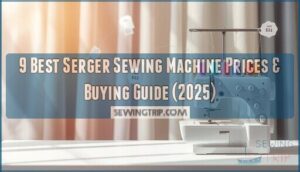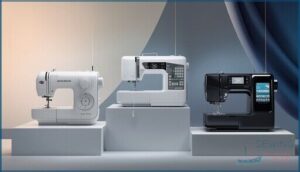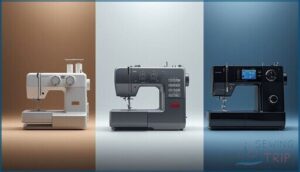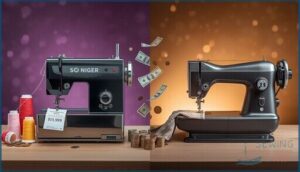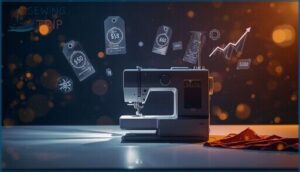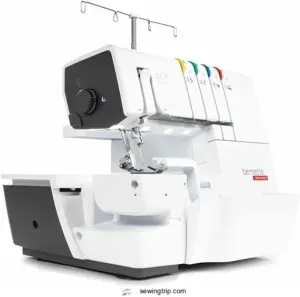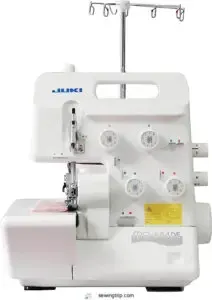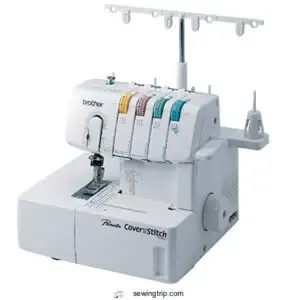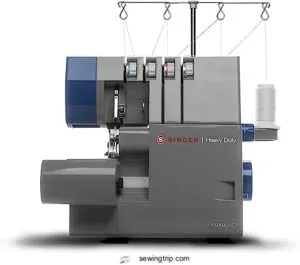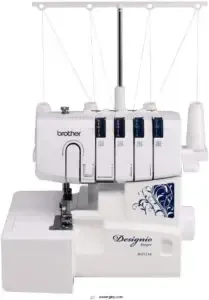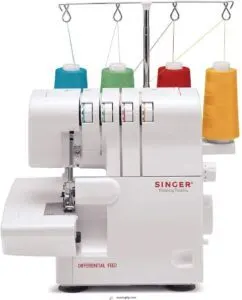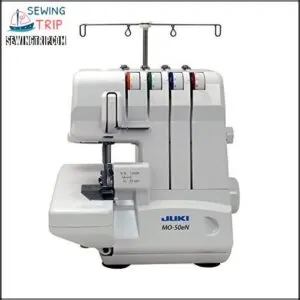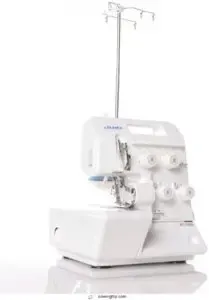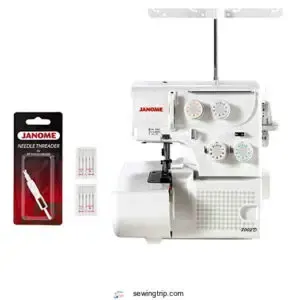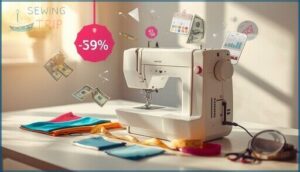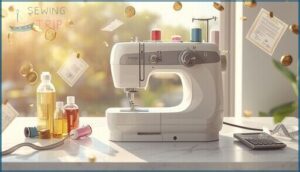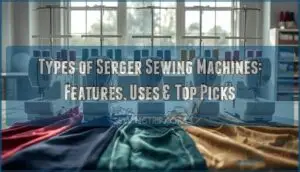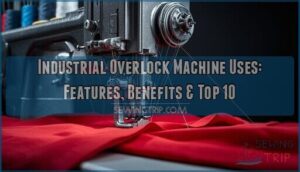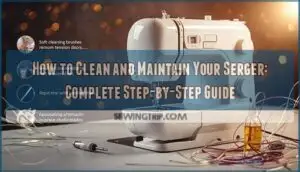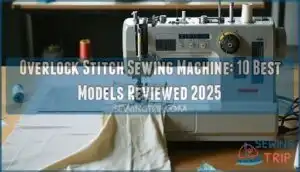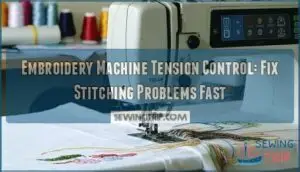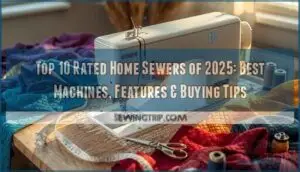This site is supported by our readers. We may earn a commission, at no cost to you, if you purchase through links.
You’ve probably seen serger sewing machine prices bounce from $200 to well over $1,500, and if you’re scratching your head wondering what justifies that gap, you’re not alone. The difference isn’t just marketing fluff—it’s about features that genuinely change how you sew.
A budget serger might handle basic overlock stitching on cotton, but throw stretchy knits or specialty fabrics at it, and you’ll quickly hit its limits. Meanwhile, mid-range and high-end models pack in differential feeds, automatic threading, and stitch versatility that transform frustrating tasks into smooth operations.
Understanding what drives serger sewing machine price helps you skip the expensive mistakes and land on a model that actually matches your projects, whether you’re hemming T-shirts in your living room or running a small alterations business.
Table Of Contents
- Key Takeaways
- Serger Sewing Machine Price Breakdown
- Key Factors Affecting Serger Prices
- Top 9 Serger Sewing Machines and Their Prices
- 1. Bernette B64 Airlock Overlocker Machine
- 2. Juki Portable Thread Serger Sewing Machine
- 3. Brother Coverstitch Serger Sewing Machine
- 4. Singer Heavy Duty Metal Frame Serger
- 5. Brother Designio DZ1234 Serger Machine
- 6. Singer Finishing Touch Serger Sewing Machine
- 7. Juki MO 50E Serger Machine
- 8. Juki MO644D Portable Home Serger
- 9. Janome 8002D Serger with Bonus Accessories
- Cost-Saving Tips for Buying a Serger
- Additional Costs and Value Considerations
- Frequently Asked Questions (FAQs)
- Conclusion
Key Takeaways
- Serger prices range from $200 entry-level machines that handle basic overlock stitching to $3,500+ premium models with automatic threading and 80+ stitch options, with the sweet spot landing around $500–$1,200 for features like differential feed and air threading that actually transform your sewing experience.
- The price gap reflects genuine functional differences—budget sergers struggle with stretchy knits and specialty fabrics while mid-range and high-end models pack in differential feeds, automatic threading systems, and stitch versatility that turn frustrating tasks into smooth operations.
- Smart shopping strategies like timing purchases around Black Friday (up to 36% off), buying certified refurbished units (30–50% savings), and exploring alternative brands like Juki or Janome can knock hundreds off your price tag without sacrificing the performance you need.
- Factor in hidden costs beyond the sticker price including $100–$150 annual maintenance, $100–$300 for essential accessories like presser feet and thread cones, plus replacement parts ranging from $15 for blades to $300 for electronic components.
Serger Sewing Machine Price Breakdown
Understanding what you’ll actually spend on a serger helps you shop smarter and avoid sticker shock.
Serger prices span a wide range depending on what level of machine you’re after and which features matter most to your projects.
Let’s break down the typical costs you can expect across entry-level, mid-range, and high-end options.
Entry-Level Vs. Mid-Range Vs. High-End Prices
How do serger costs stack up across tiers? Entry-level machines run $250–$350, delivering solid stitch quality for beginners. Mid-range options between $500–$1,000 boost user experience with air threading and speed. High-end sergers above $1,200—sometimes hitting $3,999—offer peerless machine durability and investment return.
Some models, such as the Brother DZ1234, include multiple accessories. This serger price breakdown shows feature price points climb with automation, making your serger price comparison straightforward.
Typical Price Ranges for Sergers
Understanding market segment trends helps you nail your budget. Price point analysis reveals three clear brackets:
- Entry-Level ($200–$500): Budget serger alternatives like the Brother 1034D deliver reliable overlock without breaking the bank
- Mid-Range ($500–$1,200): Juki and Janome models balance speed with durability in this sweet spot
- Premium ($2,000–$8,000): Baby Lock Triumph and Bernina L 860 dominate with air-threading tech
The market is seeing increased demand for high-quality sewing solutions.
Regional price variations and factors affecting serger costs—like promotions—can shift these brackets by 10–20%.
Cost Comparison With Regular Sewing Machines
Price range overlap at the entry level blurs the line—both sergers and sewing machines hover around $200–$500. But here’s the catch: sergers deliver specialized edge-finishing that regular machines can’t match, while sewing machines handle adaptable tasks like zippers and hems.
| Category | Serger | Sewing Machine |
|---|---|---|
| Entry-Level | $200–$500 | $100–$300 |
| Mid-Range | $400–$1,000 | $300–$700 |
| High-End | $1,000–$3,000+ | Up to $5,000+ |
Brand impact and functional value drive purchasing behaviors—you’re paying $100–$200 more for serger speed and seam strength at comparable tiers.
Key Factors Affecting Serger Prices
When you’re shopping for a serger, you’ll notice prices can swing wildly from a couple hundred bucks to several thousand. That gap isn’t random—it reflects real differences in what you’re getting under the hood.
Let’s break down the main factors that push serger prices up or down, so you know exactly what you’re paying for.
Brand Reputation and Market Position
When you’re buying a serger machine, brand reputation and pricing go hand in hand. Major players like Bernina, Baby Lock, Juki, and Brother command premium costs because of consumer perception and brand loyalty.
Market dominance drives pricing influence—Bernina starts around $400, while budget-friendly Singer and Janome appeal to cost-conscious sewers.
Brand recognition shapes your investment, affecting serger costs and long-term satisfaction.
Essential Vs. Advanced Features
When you’re comparing serger machine features, you’ll find a stark divide between basic and premium models. Essential sergers—about 92% under $500—offer adjustable stitch options, differential feed, color-coded threading systems, and built-in hem plates.
Sophisticated models bring air threading (found in only 14% globally), automatic thread tension, and programmable stitch patterns. These additional features and accessories dramatically increase your investment but deliver professional-grade control.
Number of Threads and Stitch Options
Why does thread count swing your budget so wildly? Entry-level 3–4 thread sergers run $200–$600, handling 4-thread overlock and rolled hems beautifully for beginners. Jump to 5-thread models with coverstitch capability and you’re near $1,000. Premium 8-thread combo machines offering 80+ stitch options hit $2,000–$3,500.
Thread count drives serger prices from $200 entry models to $3,500 premium machines offering 80+ professional stitch options
Here’s the thread count value breakdown:
- 2-thread models: Lightweight overedge stitching for delicate fabrics
- 3–4 thread configurations: Essential seam construction and edge finishing
- 5-thread overlock: Safety stitches plus basic coverstitch functions
- 8-thread combos: Professional decorative and utility stitch complexity costs
Automatic Threading and Specialty Functions
What makes air-threading systems command such a premium? Automatic threading adds $1,000+ to any serger’s price tag—Baby Lock’s Jet Air Threading models run $1,200–$4,399 while manual machines start at $200.
Brands bundle automation premium features: color-coded threading with needle threaders ($999), ATD systems ($1,499+), and specialty stitch versatility. That feature value directly impacts your automation premium investment across brand bundling strategies.
Top 9 Serger Sewing Machines and Their Prices
Now that you understand what drives serger pricing, let’s look at nine solid machines that won’t break the bank.
Each model on this list offers something different, whether you’re just starting out or ready to tackle more ambitious projects.
You’ll find a mix of brands and price points here, so you can figure out which one fits your sewing style and budget.
1. Bernette B64 Airlock Overlocker Machine
The Bernette 64 Airlock commands your attention with 16 stitch options and a lightning-fast 1,300 stitches per minute. You’ll appreciate the automatic air threading system that takes care of both loopers with one push, saving you frustrating minutes on setup.
Five LED lighting points brighten your workspace, while micro control fine-tunes thread tension for perfect edges. The free arm lets you tackle sleeves and cuffs effortlessly.
Usually priced around $1,499, promotional sales often drop this overlock machine to $1,199—competitive for its sophisticated feature set.
Best For: Sewers who want a feature-rich overlocker that handles everything from delicate rolled hems to heavy seam finishing without the hassle of manual looper threading.
- Automatic air threading system threads both loopers with one push, eliminating the most tedious part of serger setup
- Five LED lights and 130mm working space give you excellent visibility and room to maneuver bulky projects
- Free arm design plus knee lifter let you tackle tubular items like sleeves and cuffs with hands-free presser foot control
- Some users report the air threading system doesn’t always work reliably, forcing manual threading anyway
- Operational noise levels bother certain users during extended sewing sessions
- Warranty coverage can be void if purchased from non-authorized dealers, limiting where you can safely buy
2. Juki Portable Thread Serger Sewing Machine
Speed meets simplicity in the Juki MO654DE Portable Serger, a machine that balances 1,500 stitches per minute with color-coded threading that won’t leave beginners scratching their heads. You’ll cycle through 2, 3, or 4-thread configurations effortlessly while the differential feed accommodates everything from delicate silks to bulky knits.
Consumer reviews consistently award this portable serger 4.5 to 5 stars, praising its quiet operation and professional seam quality.
Priced between $399 and $429, it includes a 2-year warranty covering motors and electronics—solid value among serger machine brands.
Best For: Intermediate to advanced sewers who want professional-quality serging without the complexity or price tag of industrial machines.
- Fast 1,500 stitches per minute with color-coded threading that cuts setup time dramatically
- Handles everything from lightweight silks to heavy knits thanks to adjustable differential feed (0.7–2.0 ratio)
- Quiet operation and solid build quality backed by a 2-year warranty and consistently high customer ratings (4.5–5 stars)
- Threading can still frustrate complete beginners despite the color-coded guides
- Lacks advanced automatic features found in pricier models
- Requires a voltage converter for use outside standard 110V regions
3. Brother Coverstitch Serger Sewing Machine
You’ll gain professional hemming on knits with the Brother Coverstitch Serger 2340CV, a machine engineered for coverstitch and chain stitch precision at 1,100 stitches per minute. The Brother serger delivers 2-3-4 cover stitch sewing configurations with color-coded threading that simplifies setup, while its differential feed (0.7–2.0 ratio) prevents puckering on activewear and swimsuits.
Retailing around $425 in 2025, it earns 4.5-star ratings for stitch performance and includes a 2-year warranty support covering parts and labor—though demand shifts have made coverstitch capabilities increasingly competitive as hybrid models enter the market.
Best For: Home sewers and small business owners who need professional coverstitch hems on stretch fabrics like activewear, T-shirts, and swimsuits.
- Fast 1,100 stitches per minute with color-coded threading that makes setup easier than most sergers
- Differential feed (0.7–2.0) handles knits without puckering, plus you get 2-3-4 stitch configurations for versatile hemming
- Solid 2-year warranty and 4.5-star ratings show reliable performance at a mid-range $425 price point
- Thread breakage and skipped stitches pop up with certain thread types, requiring tension fiddling to get it right
- Some users struggle with releasing fabric after seams and report quality control inconsistencies between machines
- It’s coverstitch-only, so you’ll still need a separate serger for overlocking—hybrid models might offer better value now
4. Singer Heavy Duty Metal Frame Serger
You’ll appreciate the Singer Heavy Duty Serger Overlock Machine (HD0450S) at $256.99—a sturdy choice where metal frame durability meets 2-3-4 stitch quality at 1,300 stitches per minute. This heavy-duty serger machine features a 60% larger cutting knife for thick fabrics, plus color-coded threading that simplifies setup.
User reviews consistently award 4.3–4.7 stars for sturdiness and versatility, while warranty coverage includes a 25-year frame guarantee. The accessory package bundles all-purpose feet, needles, and oil in a built-in storage compartment—solid serger costs for beginners mastering professional finishes.
Best For: Sewers who want professional seam finishes without the price tag of industrial machines—whether you’re hemming knits, finishing garment seams, or tackling home decor projects with speed and consistency.
- Metal frame construction and stainless steel bed plate deliver the stability you need for thick fabrics like denim, plus a 60% larger cutting knife handles layers without jamming
- 2-3-4 thread versatility lets you switch between rolled hems, flatlock seams, and decorative edges—all at speeds up to 1,300 stitches per minute
- Color-coded threading system and adjustable differential feed make setup less frustrating, especially for first-time serger users tackling stretchy or slippery materials
- Manual threading can still be tedious even with color coding—no air threading feature means you’ll spend extra minutes rethreading after breaks or thread changes
- Instructions tend to be vague according to multiple reviews, so you may need to lean on YouTube tutorials to figure out tension adjustments or troubleshooting
- The included scrap bag is small and may require modifications or replacement if you’re working on larger projects that generate a lot of fabric waste
5. Brother Designio DZ1234 Serger Machine
The Brother Designio DZ1234 drops from around $350 retail to $300–$400 new, making it one of the most budget-friendly Brother serger options in the mid-range tier.
You’ll get 22 stitch options, differential feed for knits, and a color-coded threading system that cuts setup frustration.
Included accessories—blind hem foot, gathering foot, piping foot, plus eight cones of starter thread—add serious value when you’re buying a serger on a budget.
Warranty support extends up to 25 years on the frame, cementing this affordable serger’s long-term reliability for home sewers mastering professional finishes.
Best For: Home sewers and beginners wanting professional-quality seam finishes on knits and stretchy fabrics without breaking the bank.
- 22 built-in stitches including rolled hem and decorative options give you plenty of versatility for garment construction and home decor projects
- Color-coded threading guides and lower looper system make setup way less frustrating than older sergers
- Comes loaded with accessories—three presser feet, eight thread cones, and a full tool kit—so you can start sewing right away
- Speed control is limited, which can be tricky when you’re working on delicate fabrics or learning new techniques
- Manual isn’t super detailed, so you might need to watch online tutorials to get comfortable with some features
- Won’t handle very thick or bulky fabrics well, so it’s not ideal if you’re planning heavy-duty upholstery or denim work
6. Singer Finishing Touch Serger Sewing Machine
The Singer Finishing Touch Serger lands in the secondary market at $60–$150, with tested units commanding premiums—an affordable serger option when you’re weighing serger cost considerations against limited budgets.
Threading complexity runs higher than air-thread rivals, demanding precise looper sequencing and tweezers for reliable stitch quality.
Parts availability remains strong at $8–$36 per component, so you won’t face costly dead-ends.
Machine usability favors patient beginners ready to master manual threading, while used pricing and a 3–4 thread range deliver budget-friendly access to professional rolled hems.
Best For: Budget-conscious sewers willing to master manual threading in exchange for professional serger results at secondhand prices.
- Affordable secondary market pricing from $60–$150 lets you enter serger territory without breaking the bank
- Strong parts availability at $8–$36 per component means repairs won’t strand you with a paperweight
- Delivers professional rolled hems and 3–4 thread versatility once you’ve climbed the threading learning curve
- Threading demands precise looper sequencing and tweezers—no quick air-thread shortcuts here
- Higher complexity than modern sergers makes the initial setup frustrating for absolute beginners
- No longer sold new, so you’re hunting through used listings and dealing with variable condition and missing manuals
7. Juki MO 50E Serger Machine
If budget threading control sounds better than used Singer complexity, you’ll find the Juki MO 50E Serger at $299–$375 new—a mid-range sweet spot where stitch speed hits 1,300 spm and differential feed adjusts from 0.8 to 2.0 for stretch fabrics.
Threading complexity eases with automatic lower looper threading and LED lighting for workspace visibility, though beginners may wrestle with tension curves.
Juki backs your serger costs with a 5-year warranty, so serger machine longevity stays within reach when stitch quality matters.
Best For: Home sewists ready to tackle knit garments and professional-looking seam finishes without spending over $400 on a serger.
- Fast 1,300 stitch-per-minute speed with adjustable differential feed (0.8–2.0) handles stretchy fabrics and prevents puckering on lightweight materials.
- Automatic lower looper threader and built-in rolled hem cut down setup time compared to fully manual sergers.
- 5-year warranty and $299–$375 price point deliver solid value in the mid-range serger category.
- Threading remains tricky for beginners despite the automatic lower looper—tension adjustments take practice and patience.
- Loopers can become unthreaded during use, forcing you to re-thread the entire machine if a thread breaks mid-project.
- Not ideal for total beginners who might get frustrated with the learning curve on threading and tension settings.
8. Juki MO644D Portable Home Serger
When portability meets professional performance, the Juki MO644D portable serger delivers at $399 retail—though you’ll snag it for $325–$350 refurbished.
This budget-friendly serger machine races to 1,500 spm across 2/3/4-thread configurations, while differential feed (0.7–2.0 ratio) tames stretch fabrics with technical precision.
User satisfaction averages 4.53 out of 5, with 60% praising cost savings versus pricier models.
Juki MO644D features include color-coded threading and a dedicated knife drive, plus accessory options like gathering and piping feet expand your creative reach without breaking the bank.
Best For: Beginners and budget-conscious sewers who want professional serging capabilities without spending over $400, especially those working with stretchy or delicate fabrics.
- Speeds up to 1,500 stitches per minute with color-coded threading make it fast and beginner-friendly
- Differential feed (0.7–2.0 ratio) handles everything from thin chiffon to stretchy knits with precision
- At $399 retail (or $325–$350 refurbished), it’s 20% cheaper than comparable models while maintaining solid 4.53/5 ratings
- Requires oiling before use and ongoing maintenance, which adds a learning curve for first-time users
- 5mm presser foot lift limits work with thicker or heavily layered fabrics
- Produces significant lint and fibers during operation, requiring frequent cleanup or a collection bag
9. Janome 8002D Serger with Bonus Accessories
When affordability meets reliability, the Janome 8002D Serger hits the sweet spot at $299–$399, making it one of the most budget-friendly professional options you’ll find. Janome sergers nail the entry-level market, and this 3/4-thread convertible races to 1,300 spm with color-coded tension dials that simplify threading challenges.
Bonus accessories—blind stitch foot, extra needles, and lifetime support—boost accessory benefits considerably. Perfect beginner friendliness for home sewists, though material limitations surface with heavy denim or leather.
Market value? Excellent for buying a serger on a budget without sacrificing quality.
Best For: Beginners and home sewists who want a reliable, easy-to-use serger for finishing seams and garments without breaking the bank.
- Affordable price point between $299–$399 makes it accessible for hobbyists and those new to serging
- Color-coded tension dials and convertible 3/4-thread design simplify setup and threading for beginners
- Fast operation at 1,300 stitches per minute with bonus accessories like blind stitch foot and lifetime support included
- Struggles with heavy materials like leather or multiple layers of denim
- Threading can be tricky and threads may break frequently, requiring patience and practice
- No dust cover included and can be noisy during operation
Cost-Saving Tips for Buying a Serger
You don’t have to break the bank to bring home a quality serger. Smart shopping strategies can knock hundreds off the price tag without sacrificing performance.
Let’s explore four practical ways to save money while still getting the machine you need.
Affordable and Budget-Friendly Serger Options
If you’re buying a serger on a budget, affordable serger options under $300 deliver surprising value. Brother and Singer models dominate this space with brand reliability you can count on.
Mini sergers start around $21, though feature limitations mean they’re best for light projects.
Budget-friendly picks like the Brother 1034DX hold strong resale value, often fetching $120+ used—making DIY alternatives accessible without breaking the bank.
Shopping Sales, Discounts, and Bundles
Timing your serger purchase around Black Friday and Cyber Monday can provide discounts up to 36% off at specialty retailers. Seasonal sales between August and December showcase the best bundle values—think free accessory kits worth $120 to $400.
Sign up for loyalty discounts and coupon codes at authorized dealers, and watch for clearance events in June and July.
Online deals often include price match guarantees and flash sales throughout the year.
Considering Refurbished or Used Sergers
Certified refurbished sergers deliver 30–50% savings compared to new machines, with factory-serviced models priced from $189 to $999 depending on features. You’ll find used machines through repair shops that test equipment before sale, often with warranties comparable to retail units.
Here’s what protects your budget:
- Refurbished Reliability: Professional servicing ensures workshop-grade performance with warranties up to 25 years
- Used Market: All-metal sergers outlast plastic-gear models, with DIY repairs costing under $10
- Buyer Protection: Certified dealers offer return policies and technical support plans
Comparing Alternative Brands and Models
You’ll discover better features at lower prices by exploring Baby Lock, Juki, Janome sergers, and Singer serger models. The Juki MO-654DEN delivers 1,500 SPM speed for $449, while Brother 1034D offers solid 3/4-thread capacity at $300.
Air-threading comparison reveals Bernette’s system costs 23% less than premium equivalents. Check stitch memory, thread capacity, and pressure adjustment specs—mid-range alternatives outperform pricier brands.
Additional Costs and Value Considerations
Buying a serger isn’t just about the sticker price—you’ll want to factor in what comes next. From routine maintenance to handy add-ons, these hidden expenses can add up or save you money depending on how you approach them.
Let’s break down what you need to budget for beyond your initial purchase.
Maintenance, Repairs, and Servicing Fees
You’ll spend between $100 and $150 annually on routine serger maintenance and repair costs, including cleaning, oiling, and thread tension adjustments. Regional price variation means urban areas charge more—sometimes $200 per session.
Service plan costs run $300 to $500 for three-year coverage, a smart move if you’re tackling heavy projects.
DIY maintenance saves money, though complex repairs warrant professional help.
Accessories and Add-Ons Affecting Price
Beyond the machine itself, you’re looking at $100 to $300 for essential add-ons. Presser feet like beading feet and blindstitch feet run $15 to $60 each, while extension tables add $60 to $120. Thread cones cost $3 to $8, and you’ll need several.
Tool kits for maintenance range from $25 to $60.
Don’t forget education costs—workbooks and classes run $30 to $75.
Long-Term Value Vs. Upfront Cost
Your upfront budget matters, but here’s the real story: entry-level sergers depreciate 5% annually, while premium brands like Pfaff show 52% value loss over time. Factor in $50–$100 yearly maintenance expenses and thread costs.
ROI calculation? If you’re making 10+ knit garments yearly, you’ll recoup costs through time savings and professional finishes.
Demand trends and brand reputation directly impact resale market value—making cost-effective investment choices essential for long-term returns.
DIY Modifications and Upgrades
You can upgrade your serger without breaking the bank. DIY serger modifications offer budget-friendly improvements that improve machine features:
- Lighting Upgrades: LED bulbs start at $17.99, improving workspace visibility
- Presser Feet: Individual feet cost $8–$20; multi-piece sets drop to under $4 per foot
- Extension Tables: Compact 18×18″ surfaces run around $99
Thread Management systems and Knife Replacement stay affordable when you tackle them yourself.
Frequently Asked Questions (FAQs)
What warranty coverage do serger machines include?
Most serger machines include a 1-year mechanical warranty and 6-month electronics coverage.
Premium brands like Singer offer up to 25 years on components, while Baby Lock requires authorized retailers for warranty activation.
Are financing options available for expensive sergers?
Yes, around 72% of retailers now offer financing programs for high-end sergers. You’ll find interest-free deals, flexible payment terms, and approval rates reaching 85%, making expensive machines accessible without depleting your budget upfront.
Do serger prices vary by country or region?
Absolutely. Import duties, along with currency exchange rates and regional price factors, impact what you’ll pay.
Market demand and brand pricing strategies greatly shift costs—sometimes 10-30% higher in Europe or Australia versus Asia.
Whats the resale value of used sergers?
Most used sergers retain 40% to 60% of their original price. Brand reputation, condition, and accessories drive resale value—machines from Juki or Baby Lock often fetch higher prices in today’s budget-friendly secondary market.
How much do replacement parts typically cost?
Replacement presser foot costs range from $15 to $70, while blade and looper pricing stays under $ Electronic components run $65 to $ OEM premiums add 65% over aftermarket accessories, affecting your maintenance budget considerably.
Conclusion
Picture Sarah, a home sewer who jumped from a $200 basic serger to a $600 mid-range model—suddenly her knit projects stopped puckering and threading took seconds instead of twenty minutes. That’s the real-world impact of understanding serger sewing machine price differences.
You don’t need the priciest option, but matching your budget to actual features you’ll use transforms frustration into capability. Choose smart, sew better, and skip buyer’s remorse entirely.
- https://www.mordorintelligence.com/industry-reports/sewing-machines-market
- https://www.fullemachinery.com/blog/future-market-trends-serger-overlock-machine-2025/
- https://www.cognitivemarketresearch.com/sewing-machine-market-report
- https://blog.closetcorepatterns.com/the-best-sergers-and-overlockers/
- https://www.sewingmachinefun.com/how-much-does-a-serger-cost/

